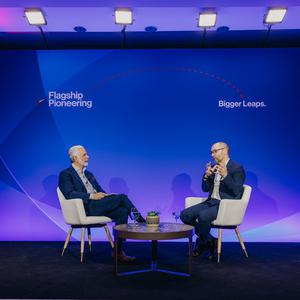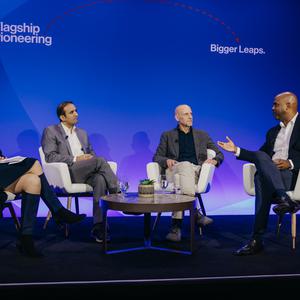The financial downturn that hit biotech in the last year and half may be daunting to budding entrepreneurs, but Flagship General Partner Geoffrey von Maltzahn says the unrelenting pace of technological development in biotech is more important than current market conditions. A hopeful moment amid the storm came this past April, as he led an over $300 million Series C raise for Flagship-founded Tessera Therapeutics. We spoke to von Maltzahn to understand more about this era of life science entrepreneurship, including why teams are best suited to developing world-changing ideas and what resource is more precious than capital.
Why did you decide entrepreneurship, and not academia, was the career path for you?
I had, like many people, the presumption that the most innovative people go into academia. As I finished graduate school, I saw myself heading down an academic trajectory, and I enthusiastically enjoyed the intellectual freedom to push the frontiers of technology forward. I was also lucky enough to get involved in a couple of startups during this time, and I loved the partnership, lack of disciplinary boundaries, and the need to learn voraciously. I started to see a contrast between my experiences in the inherent team orientation of startup environments and academia, where the incentives often encouraged individualism and conservatism, particularly when it comes to funding and specialization. What energized me the most was the ability to follow one’s curiosity and team up with other people to take a big bite out of some of society’s most important challenges.
Why was Flagship the place you decided to pursue these goals?
I joined Flagship because of the combination of outstanding people, a ‘change the world’ mindset, and belief in training people to acquire the daunting complexity of professional skills that you need to be a great life science entrepreneur. People do not necessarily appreciate from the outside that Flagship is equal parts educational institution for professional entrepreneurs as it is foundry for innovation and company generation. Mentorship culture is so important within an entrepreneurial institution, as we work together to try and simultaneously master science and technology, manufacturing, intellectual property, value, finance, legal constraints, regulatory processes, and the leadership and inspiration of talented people. Although one would be wise to seek mentorship if trying to master any one of those skills, for some odd reason, entrepreneurial people are sometimes advised that the “best way to learn is to go off on your own,” which is quizzical and destructive advice. I think of Flagship as a kind of chemical reactor for concentrating, sharing, and growing entrepreneurial skill at a faster rate than would be feasible on the outside.
You started at Flagship in 2009, shortly after the 2008 financial crisis — how do you think about innovating in fluctuating market conditions?
We all have the privilege of innovating in an era when biology is shifting from a domain defined by expensive trial and error to a predictive, deterministic endeavor. When that happened to other domains like chemical and electrical systems, the whole world changed. For this reason, I’m of the opinion that many of the most impactful life science companies have yet to be founded or are just startups today. This fundamental dynamic is more important than the instant market conditions.
While down markets unquestionably make things harder, they can also be a reminder of why we do this — we’re all trying to solve important problems in novel ways, doing things we’ll take great pride in decades from now. When capital is scarce, there can be a lot of temptation to do something that’s a variation on an established theme because the world is already ascribing value to that and ‘success’ seems more assured. But what these temptations disguise is another risk that, even in the case of success, the outcome doesn't really matter because a version of it already exists and you haven’t dramatically changed what’s possible.
At Flagship, our view is that in good times and bad, it’s far better to pioneer. After all, the most precious and scarcest resource that goes into companies isn’t capital — it’s the time and passion of extraordinary people. We don't get to work on very many things in our lives and we should put our time into things that aren’t just good or great, but that we would regret not working on if we chose to do otherwise.






